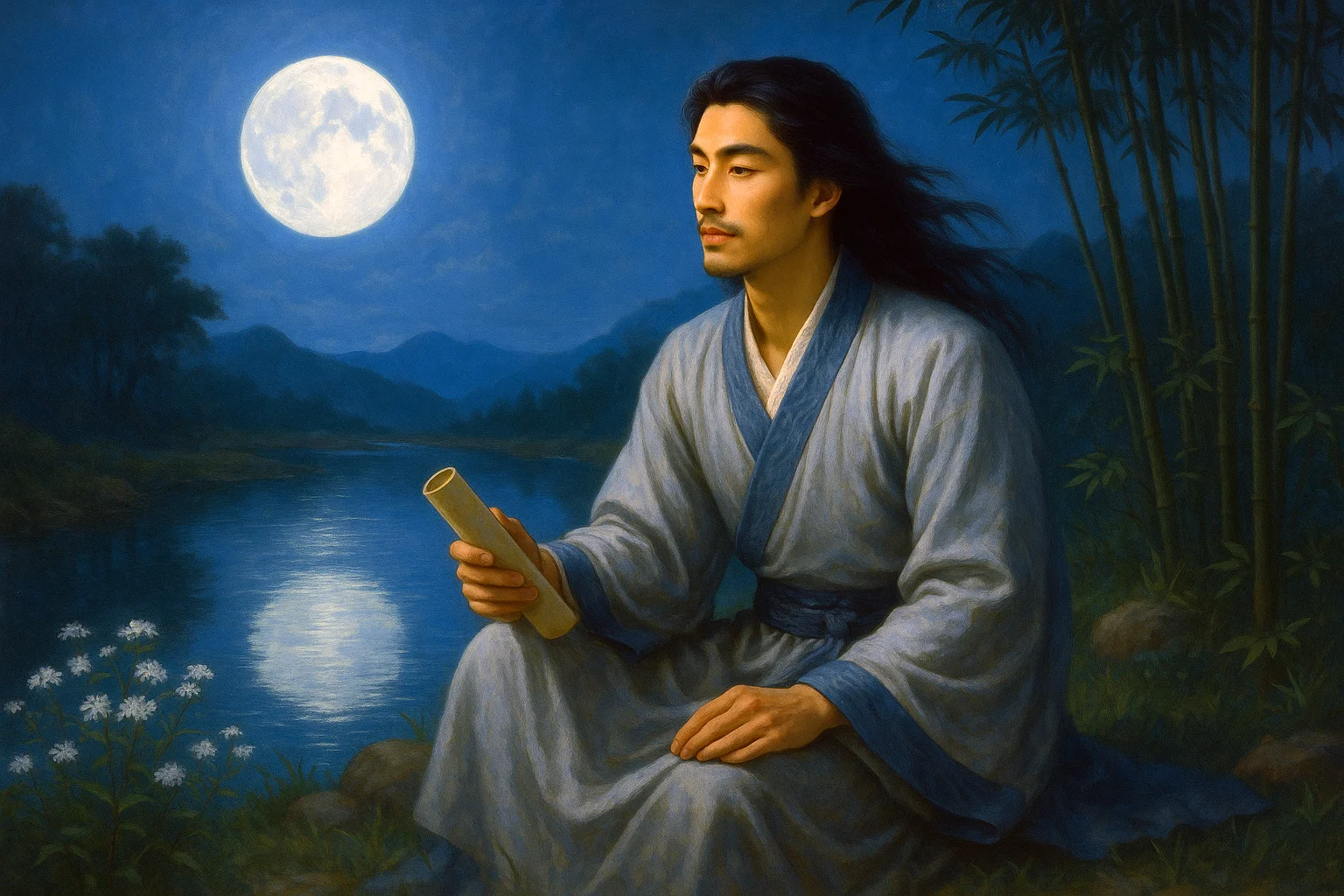A day's algebra of thoughts,
A night's calculus of oughts.
Daymath plus nightcount—
Seasons compound without amount.
My friend governs that far county,
Goujian's coastal exile bounty.
Does he still recall the way
To parse absence from delay?
I'm but roadside dust awaiting chariots,
How dare eye Mount Song's summits?
Or claim my creek's thin melody
Matches the sea's eternity?
Peak of Virtue, Ocean of Lore—
I dredge them dry to the core.
Yet this sorrowful arithmetic,
Does it reach his politic?
Original Poem
「一昼千万思」
曾巩
一昼千万思,一夜千万愁。
昼思复夜愁,昼夜千万秋。
故人远为县,海边勾践州。
故人道何如,不间也与周。
我如道边尘,安能望嵩丘。
又若涧与溪,敢比沧海流。
景山与学海,汲汲强自谋。
愁思虽尔勤,故人得知不。
Interpretation
Likely composed during Zeng Gong's early career transitions or provincial postings, this introspective work addresses an unnamed "old friend"—possibly a fellow examination candidate or reform-minded colleague. Written when physical separation compounded professional uncertainties, the poem's stark emotional directness breaks from Zeng's typically measured style, revealing vulnerability beneath his public persona as a model bureaucrat. Its recursive structure and aquatic metaphors trace a psychological journey from anxious attachment to self-affirmation through scholarly devotion.
First Couplet: "一昼千万思,一夜千万愁。"
Yī zhòu qiān wàn sī, yī yè qiān wàn chóu.
Daylight spawns ten thousand thoughts; / darkness breeds ten thousand dreads.
The numerical hyperbole "ten thousand" (千万) quantifies cognitive overload, while the diurnal alternation "daylight-darkness" establishes an inescapable cycle. The parallel structure mirrors the mind's trapped motion, like a treadwheel of worry.
Second Couplet: "昼思复夜愁,昼夜千万秋。"
Zhòu sī fù yè chóu, zhòu yè qiān wàn qiū.
Thoughts by day, dreads by night—/ each cycle an autumn's blight.
Here, time itself becomes seasonal—the diurnal cycle condensing into recurrent autumns, traditional metaphor for decline. The temporal claustrophobia anticipates modernist depictions of psychological time.
Third Couplet: "故人远为县,海边勾践州。"
Gùrén yuǎn wéi xiàn, hǎibiān Gōujiàn zhōu.
My friend governs some frontier post—/ coastal lands where Goujian lost.
The historical allusion to Goujian (勾践), the Yue king who endured humiliation before reconquest, politicizes geography. The friend's posting transforms into a site of potential exile and future redemption, reflecting Song intellectuals' view of provincial appointments.
Fourth Couplet: "故人道何如,不间也与周。"
Gùrén dào hérú, bù jiàn yě yǔ zhōu.
What news of his circumstance? / No couriers, no shared glance.
The interrogative cracks the poem's solipsism, reaching toward connection. "No couriers" (不间) underscores communication breakdowns plaguing Song bureaucracy, where distance bred informational voids.
Fifth Couplet: "我如道边尘,安能望嵩丘。"
Wǒ rú dào biān chén, ān néng wàng Sōng qiū.
I'm but roadside dust—how presume / to gaze on Sacred Peak's plume?
The self-abasing "roadside dust" (道边尘) contrasts with Songshan (嵩丘), axis mundi of Tang-Song political cosmology. This spatial metaphor articulates the poet's perceived marginality within power hierarchies.
Sixth Couplet: "又若涧与溪,敢比沧海流。"
Yòu ruò jiàn yǔ xī, gǎn bǐ cāng hǎi liú.
Or a ravine's thin course—dare / rival the sea's torrential air?
The hydrological metaphor extends the inferiority complex—the friend as oceanic vastness to the poet's trickling stream. Yet the very act of comparison hints at subterranean connections between tributary and main.
Seventh Couplet: "景山与学海,汲汲强自谋。"
Jǐng shān yǔ xué hǎi, jí jí qiǎng zì móu.
Peak of Classics, Sea of Lore—/ I labor toward that distant shore.
The pivot: "Peak of Classics" (景山) and "Sea of Learning" (学海) become alternative sacred geographies. The reduplicative "labor-labor" (汲汲) signals determined self-cultivation as counterweight to political frustrations.
Eighth Couplet: "愁思虽尔勤,故人得知不。"
Chóu sī suī ěr qín, gùrén dé zhī bù.
Though this sorrow burns so true—/ does its heat transmit to you?
The closing question refracts the opening's anxiety through scholarly resolve. The thermal metaphor "burns" (勤) suggests emotional energy transmuted into intellectual pursuit, leaving the transmission ambiguous—an epistolary poem that may never reach its addressee.
Holistic Appreciation
The poem begins with the poignant phrase "daylong thoughts and nightlong sorrows," unfolding in a progression of interconnected emotions that flow without break. Through profound longing for a friend, Zeng Gong reflects on life's circumstances and contemplates his own worth. Comparing himself to dust and mountain streams, he reveals an innate character marked by humility and detachment from power. Yet in references to "Jing Mountain and the sea of learning," he also betrays an unyielding spirit of self-cultivation. The closing question lingers with a touch of melancholy amidst deep affection. Delicate in emotion and clear in structural progression, the poem blends introspection with reason, showcasing Zeng Gong's profound personal ethos and highly self-aware literati cultivation.
Artistic Merits
- Genuine Emotion, Layered Progression
Starting with day-and-night melancholy, the poet transitions to missing his friend, then turns inward before returning to the emotional core—a complete and organic structure. - Natural Allusions, Profound Meaning
References like "Goujian's province," "Song Hill," and "vast sea" are seamlessly integrated, enriching the poem's semantic and philosophical depth. - Multi-faceted Self-Comparison, Humble Yet Insightful
Likening himself to dust, streams, and a trivial scholar reflects the poet's clear self-awareness and life perspective. - Reason Within Poetry, Ambition Within Emotion
Though a lyrical short poem, it contains deep meditation on life's dilemmas and personal aspirations.
Insights
This poem reminds us that true friendship, though separated by distance, can traverse day and night, spanning miles to touch the heart. Through humble self-comparisons, the poet expresses inner yearnings and unease, while urging us: even in loneliness and misunderstanding, we must quietly pursue inner growth like him—holding fast to ideals without self-abandonment in lowly stations. Today, such "endless thoughts" and "boundless sorrows" still resonate as a shared inner experience.
About the Poet

Zeng Gong (曾巩, 1019 - 1083), a native of Nanfeng in Jiangxi province, stands among the illustrious "Eight Great Masters of Tang-Song Prose." His writings distinguished themselves through an elegant classical balance, celebrated for their rigorous argumentation and refined literary craftsmanship. While his poetry embraced an artless subtlety, his prose achieved what critics hailed as "the very essence of purity" - an achievement that, though perhaps less dazzling than his contemporaries like Su Shi or Wang Anshi, earned him posthumous reverence as the founding master of the "Nanfeng Literary School."












